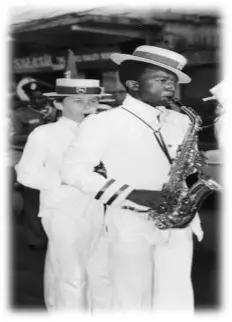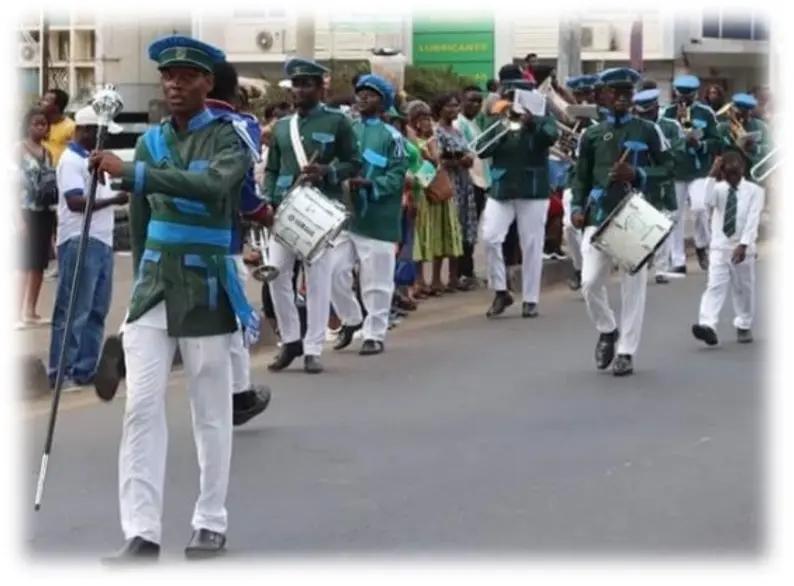Prince of Wales School Brass Band
The Prince of Wales School Brass Band has its origins in the Prince of Wales School. Music was offered at the school in earlier years but faded out for unknown reasons.
Happily, the arrival of Mr. Jonathan Fitzjohn in 1969 was a rebirth of music in the school curriculum. To support and enhance music in the school curriculum, some recorders were purchased to enable to forming of an ensemble along with a set of pitched and non-pitched instruments, such as glockenspiels, xylophones, metallophones, castanets, tambourines, timpani and cymbals.
The ensemble performed at Speech Day ceremonies, on the radio and at other venues. Along with singing, these instruments allowed a broad spectrum of students to develop musicianship.
Some of the student who played these instruments were Dr. Julius Spencer, Cecil Tony Jones, Nathaniel Nelson-Streeter, Victor Macauley, Edward Smythe, Edmond Pratt (Bassoon), Peter Berrie, Dennis Nelson-Streeter, the late Donald Williams, Dr. Donald George, Ralph Shepherd, Donald Manley, Donald Scott and Brown-Dawson.


At Speech Day 1974, the ensemble performed “The Blue Danube” with the school choir and two other German pieces. This performance encouraged the Alumni Association to invest in a marching band and so the members of the ensemble became founder members of the band and others who joined at this stage included Christopher Davies, Alieu Iscandri, Dr, Ethan Harris-Faulkner, Anis Adams, Cyril Faulkner, Omodele Faulkner, Abdul Iscandri, Eugene Nichols, Collins Pratt, Keith Aki-Sawyer, Arnold Kanu and others joined the band.
Mr Fitzjohn has observed that formation of the band started a shift away from music in the curriculum to marching band music. The uniform then was white shirts and trousers and the school tie. For the 50th anniversary in 1975, we wore our ceremonial uniform with a green sash. Those first instruments were quite basic and most likely sub-standard. The sound production was embarrassing and the band had to deal with what they had and brush away comments from onlookers. The drums were roped and it took us about ten minutes to tune them.
The marches played then were Onward Christian Soldiers, John Brown’s Body, Happy Wanderer, John Peel and Shekpendeh. They played long drum roll intervals between marches. “We had so much zeal and inspiration to be one of the best someday” (quote from Nathaniel Kwame Nelson Streeter).
Experienced bandmasters and leaders from other marching bands, namely Assistant Commissioner of Police Pa Allen, the Late Willie O Pratt and Justice Ebu Thomas, started visiting to assist at band practice. At that time, some folks were declared “honorary” Old Princewaleans so that they could play in the band! Messrs. Bockarie, Sam and John from the Police Band were the first recipients of that honour. After the Independence Day March in 1978 which ended at the National Stadium, the late Colonel John Bangura, band master of the Military band sent Sergeant Kelly to work with the band, particularly with the drums. This kind gesture made a lot of difference because the drummers were a lot to contend with!!
Thanks to support from Pa Allen in providing the scores, the band started playing “real” marching pieces. “Marching Through Georgia was the very first challenge. “When we played Colonel Bogey and Standard of St. George, we were in top form and shocked the nation!” (quote from Nathaniel Kwame Nelson Streeter).


Victor Williams on Sax Jonathan Fitzjohn & Alvan Langley
Not long after achieving such heights, Mr. Jonathan Fitzjohn left for greener pastures and Mr. Alvan Langley, music teacher for the afternoon shift, was left in charge of the band. He quickly transferred the day to day affairs of the band to Victor Macauley and Nathaniel Kwame Nelson Streeter. The present bandsmen are encouraged to give Victor Macauley the utmost respect in the band (“Give Honour to Whom Honour is Due”). “We called him SHAFT” (quote from Nathanel Kwame Nelson Streeter), “and we named a drum roll after him as well!”
Victor gave his time and finances to keep the band going. Also, this transition period is when Emeric “Ewe” Williams (a gentleman who is mentally challenged) came to be part and parcel of the band. He used to assist in picking up and dropping off the instruments for engagements. The band recruited many present and past pupils along the way such as Dr. Harold Roy-Macauley, , Randolph Pratt (Kalala), Alhaji Alghali, Ernest Benjamin, Ivan Benjamin and Dr. Jide Pratt just to name a few.
“We bandsmen were not allowed to participate in after-performance refreshments because of our young age and this tradition was kept for a long time. However, there were always soft drinks and biscuits provided by Victor, Donald Williams and me. Sometimes folks were more after the girls than the refreshment. This was done discreetly with your ties, jackets and boaters / caps off.” (quote from Nathaniel Kwame Nelson Streeter).
Having gone through this stressful ordeal for two or more years, the late Rev Ernest Redwood-Sawyerr came to the band’s rescue in 1980. The first thing he did was to change the uniform and he paid for this out of his own pocket. The new uniform was white jacket with green shoulder straps, covered pockets and two stripes at the bottom of the sleeves. The change of uniform led to change of attitudes.


Discipline was at its best with Pa Sawyer. He was held in high esteem in society and the band’s confidence started building up again. He met the financial needs of the band and, through his leadership, the band was able to get more instruments of a better quality. He was bringing in new pieces all the time and the band wasted no time in doing justice to them. “No march was a problem for us anymore” (quote Nathaniel Kwame Nelson Streeter).
In 1990 the uniform was again changed to green jacket with blue sholder straps, two covered pockets at the bottom and one at the top left with one stripe at the bottom of the sleeves.
In 1980, Ethan Harris-Faulkner was appointed in the capacity of band leader to assist Pa Sawyerr in running the affairs of the band. The leadership of the band was handed over to Mr. James Benka-Coker in 1990 as band leader. His role was both as administrator and music director. He acted in that capacity until a new constitution was about to be adopted in 1996.
In 1995 during the 70th anniversary of the school, the band introduced a ceremonial uniform (P-Coat) and, in 2000, the ceremoinal uniform was again changed from P-Coat to the present day ceremonial uniform which is green jacket with blue Sholder stripes and two strips at the bottom of the sleeves.
In 2000, the band also organised its first thanksgiving service at the Warren Memorial Methodist Church on Kroo Town Road and, in 2007, under the leadership of William Lewis the band was proud to be and still remain the only school band that has come up with an opera-inspired performance called The King’s Gift.


2007 The King’s Gift Performed at The British Council
With the new constitution, an executive was appointed to run the band’s affairs. Prior to the new constitution coming into existence, an interim executive was elected in 1996, led by Mr. David Peters who oversaw the transition.
Under the new constitution, the leadership of the band was split between a Band Leader who oversaw the administration of the band and a Music Director who oversaw its musicianship.
The first Band Leader under the new constitution was Mr. George Shepherd and the first Music Director was Mr. James Benka-Coker who left the shores of Freetown after the military coup in 1997. The late Rev. Victor Warne, then the Deputy Music Director, took over the Music Directorship of the band and served till 1999.
The Prince of Wales School Band is today composed of past and present pupils. Many Princewaleans and non-Princewaleans have contributed immensely over forty seven years and more with notable contributions from Mr. Jonathan Fitz-John, Victor Macauley (Shaft), Rev Ernest Redwood-Sawyerr (Pa Sawyerr), Ethan Harris-Faulkner, James Benka-Coker, Eugene Onipede Gabbidon, Vivian Walt-Macfoy and William Lewis. The average age of the band remains at 13 as more younger players are being recruited to enhance performance.
More recently, the band has extended a teaching aid to other bands including The Freetown Secondary School for Girls (FSSG) Brass Band, Vine Memorial Secondary School Brass Band and the Government Technical Secondary School Brass Band. In 2006, along with the internationally-based charity group “All As One”, they helped to raise funding for the female prisoners at Pademba Road Prisons (now the Correctional Centre).


Accolades
• Smile Salone Brass Band of the Year Winners 2003
• Ballanta Academy of Music National Brass Band Champions 2004
• Ballanta Academy of Music National Brass Band Champions 2005
• Ballanta Academy of Music National Brass Band Runners-Up 2006
• The People’s Choice Awards Winners 2006
• Football Championship for Brass Band Winners 2005
• Football Championship for Brass Band Winners 2006
Membership of other bodies
The band is a member of the National Secondary Schools Brass Band Association, an Association comprises of Sierra Leone secondary schools Brass Band.
Band Masters of Prince of Wales School Brass Band
- Jonathan Fitzjohn (1974-1978)
- Alvan Langley (1978)
- Victor Macauley (1978-1980)
- Rev. Ernest Redwood-Sawyer (1980-1990)
- Raymond Wright (1992)
- Mr. Cecil Tony Jones (1994-1995 Never took up office)
- Hon. Just. Cornelius Harding (Hon. Bandmaster 2000)
Band Leaders of Prince of Wales School Brass Band
Ethan Harris-Faulkner (1982-1990)
James Benka-Coker (1990-1994)
David Peters (1996 Interim)
George Shepherd (1996-1997)
Vivian Walt-Macfoy (1997-2005)
William Lewis (2005-2008)
Vivian Macfoy (2008-2011)
Eugene Gabbidon (2011-2014)
Ebun Pratt (2014-2023)
Rev Neilford E.W Rose (2023 to date)
Music Directors of Prince of Wales School Brass Band
James Benka-Coker (1990-1997)
Rev. Victor Warne (1997-1998)
Eugene Gabbidon (1998-2005)
Raymond Faux (2005-2007)
Rodney Nelson-Streeter (2007-2009)
Eugene Gabbidon (2009-2011)
Rodney Nelson-Streeter (2011-2014)
Eugene Gabbidon (2014 to date)





